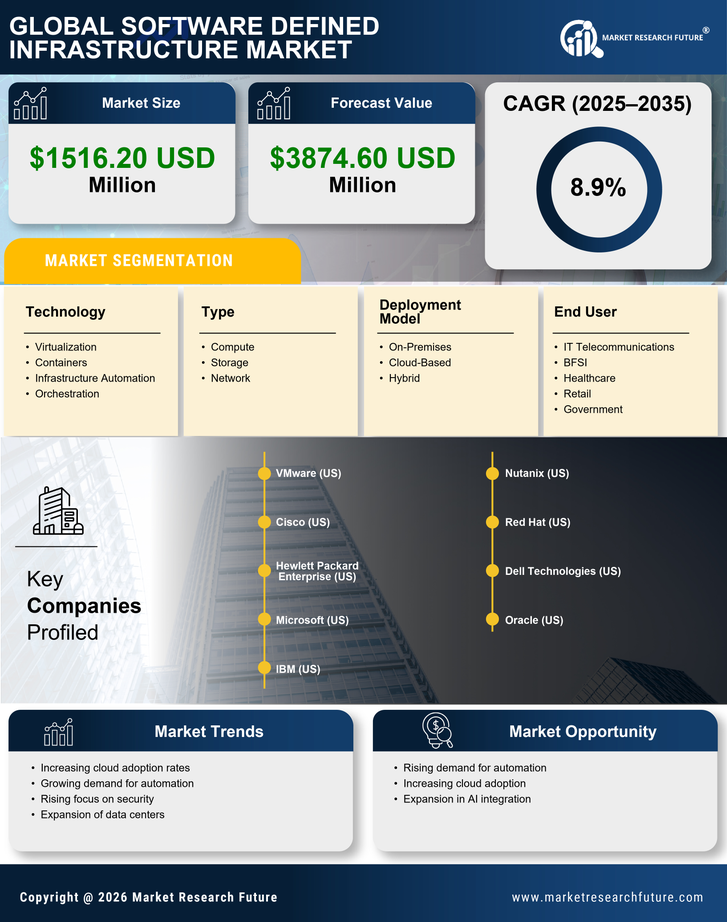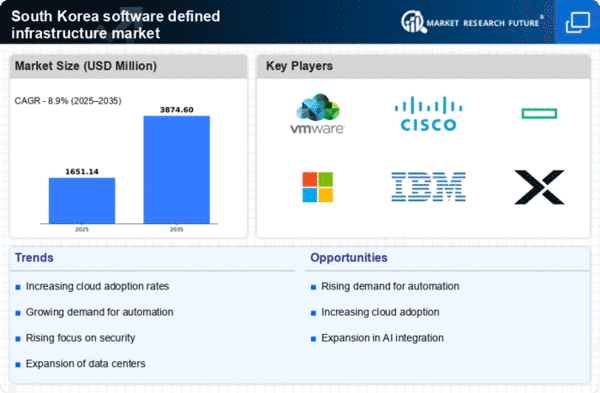Focus on Energy Efficiency
Energy efficiency has emerged as a critical driver in the software defined-infrastructure market in South Korea. With rising energy costs and increasing environmental concerns, organizations are prioritizing sustainable practices. Data indicates that companies implementing energy-efficient infrastructure solutions can reduce operational costs by up to 30%. This focus on sustainability not only aligns with corporate social responsibility goals but also enhances the competitiveness of businesses in the software defined-infrastructure market. As a result, vendors are likely to innovate and offer solutions that emphasize energy efficiency, catering to the growing demand for greener technologies.
Rising Demand for Scalability
The software defined-infrastructure market in South Korea experiences a notable surge in demand for scalable solutions. As businesses increasingly seek to adapt to fluctuating workloads, the ability to scale infrastructure dynamically becomes paramount. This trend is particularly evident in sectors such as finance and telecommunications, where operational efficiency is critical. According to recent data, approximately 70% of enterprises in South Korea prioritize scalability in their IT investments. This growing emphasis on flexible infrastructure solutions is likely to drive innovation and competition within the software defined-infrastructure market, as providers strive to meet the evolving needs of their clients.
Integration of AI and Automation
The integration of artificial intelligence (AI) and automation technologies is transforming the software defined-infrastructure market in South Korea. Organizations are increasingly leveraging AI to optimize resource allocation and enhance operational efficiency. This trend is reflected in a report indicating that over 60% of IT decision-makers in South Korea are investing in AI-driven solutions to streamline their infrastructure management. The potential for automation to reduce operational costs and improve service delivery is compelling, suggesting that the software defined-infrastructure market will continue to evolve as companies adopt these advanced technologies.
Shift Towards Hybrid IT Environments
The shift towards hybrid IT environments is reshaping the software defined-infrastructure market in South Korea. Organizations are increasingly adopting a combination of on-premises and cloud-based solutions to optimize their IT strategies. This trend is driven by the need for flexibility, cost-effectiveness, and enhanced performance. Recent surveys indicate that nearly 65% of South Korean enterprises are exploring hybrid models to balance their workloads effectively. This transition is expected to create new opportunities for vendors in the software defined-infrastructure market, as they develop solutions that facilitate seamless integration between various IT environments.
Increased Focus on Data Privacy Regulations
The software defined-infrastructure market in South Korea is significantly influenced by the increasing focus on data privacy regulations. As the government implements stricter data protection laws, organizations are compelled to enhance their compliance measures. This regulatory landscape drives demand for infrastructure solutions that prioritize data security and privacy. Reports suggest that approximately 75% of businesses in South Korea are investing in technologies that ensure compliance with these regulations. Consequently, the software defined-infrastructure market is likely to see a rise in offerings that address these compliance challenges, fostering innovation and growth.

















